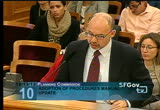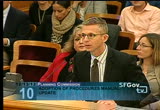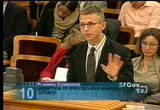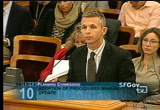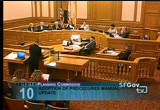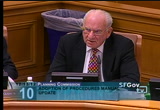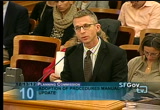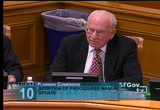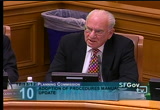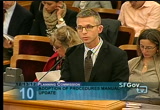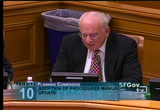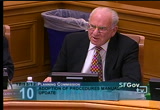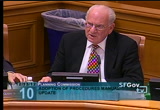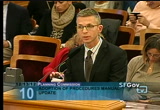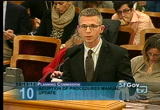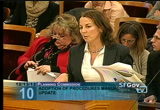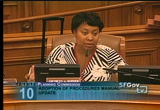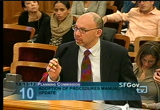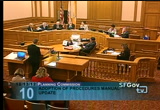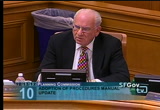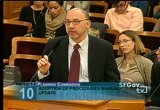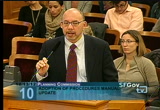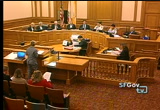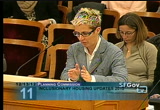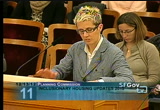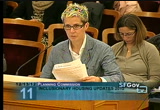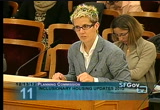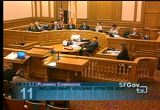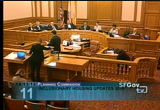tv [untitled] December 28, 2012 10:00pm-10:30pm PST
10:00 pm
$750,000 a year with our down payment assistance, specifically to bmr owners. i think those are the major points that you had asked about that are program-wide, if there are any questions i would be happy to answer those before i bring up mr. adams. thank you, mr. chue. looks like no questions, but the commissioners may have questions after the presentation. >> thank you, commissioner. >> good afternoon, dan adams with the mayor's office of housing. very happy to be here to submit your approval for the procedures manual for inclusion. we were here before you for an informational update and during that hearing my colleague sandra egan did a
10:01 pm
good job. i have a more narrow task, which is good because i have a much more narrow skillset in that area. so i will read through the minor modifications that have happened since the last hearing. we have done additional outreach. we have gotten some input from other stakeholders, internal that have generated a few reviews to the manual. again the housing trust fund -- the passage of the housing trust fund will generate some modifications to the manual and we plan on come back to you next year for that update. this update doesn't contemplate or contradict any of the housing trust fund work. i'm going to refer to a memo included in your packet, which outlines the few changes that
10:02 pm
have happened since the last hearing. the first there was a clarification had a we made that bmr on-site ownership will be priced at 90% ami. we wanted to make that explicit and we added the phrase for those units not able to save, "the owner must make good-faith efforts to ensure that before any modification to the sale price is made, that the owner during a six -month period is making a good-faith effort to sell the unit under the current program." similar to the first point, we're clarifying that the bmr rental pricing is at 65% ami, also having included a range in the earlier version. we're provide something flexibility in terms of the annual certificate if he annual certificate if he annual certificate if he xinc c: program filesxinc c: stenoprogram filesxinc c: stenoprogram filesxinc c: stenoprogram filesxinc c: ificate.trn /r/t}{(
10:03 pm
recertification of income. the fourth point compliance is referenced to the land dedication to give additional instruction to the planners to identify in the review process whether the land dedication applies to a single site or multiple sites in cases where there are multiple parcels being dedicated under the land dedication model. also under the land dedication model, we make clear that the approval letter that moe issues can change, but only under situations based on new information. but approval by the mayor and the board of supervisors is of course final.
10:04 pm
and finally, important insertion under our bmr rental to ownership conversion rule. where the right of first refusal for the existing resident includes pricing at the original bmr rental rate. or the actual income level of the renter, in cases where the existing occupant or tenant, their income has increased above the rental level. the pricing of the unit under that first right of first refusal scenario would be priced per their actual income level. so those are the highlight modifications that i wanted to bring forth. and i too will be here for any questions. >> thank you. >> thank you. >> why don't we take a few clarifying questions first or public comment? >> public comment. >> let's take public comment on this item.
10:05 pm
seeing none, public comment is closed commissioner antonini. >> thank you, i had a couple of questions on the memo. and i am led to believe when i first saw this, i thought it was the entire program. but this is only a memo dealing with the resale of existing ownership units and then dealing with the other entities here. for example, as i recall unless it's changed, your for-sale ownership units are 100 ami and it can be up to 120 in some instances, but i believe it's always been at 100 ami has been the price for-sale units. and then the rental units at 60 ami? >> that is correct, but there has been adjustment.
10:06 pm
there are two ami tables that we use in san francisco. there is a tri-county, or three county ami table. at one point the board of supervisors directed us to use a san francisco-specific table and given the relative wealth of our adjacent counties to the south and north, san francisco's ami is about 10% lower than the tri-county ami. so san francisco -- 100% ami is equivalent to 90% in san
10:07 pm
francisco and that is called out here. similarly on the rental side, it coordinates to 55%. >> i understand what you are doing, but i don't really understand why an off-sale unit would be at 70 and not 90? what is the difference between that being on-site and off-site? >> i think my understanding that this policy is a consistent policy that we have had. unfortunately i can't speak to the distinction between those ami levels. how to i believe it's not a new policy. it's consistent with what we have seen previously. >> it's significant for me and any time we approve these projects for sale that was at the tri-county and i understand your adjustment.
10:08 pm
the other problem is the downward adjustment raises the subsidy, because as you know, when you do an ami unit, it costs more at the lower income level because the price you charge has to become compensatorily lower and therefore, the subsidy from the rest of the project to make that is higher. so what you are doing is making it more difficult for middle-income people to buy market-rate units by making them more expensive. although i know your program doesn't influence the cost of housing in the whole city. but the worst part of it is t probably doesn't address that income group from the 90 to the 120, or 130th percentile. so those are some arguments i would make for rethinking the percentages that you put on there. >> if i could just in really
10:09 pm
quick on that? >> go ahead. >> one thing to keep in mind is the on-site and off-site are options that can be chosen by the developer. so there is no requirement that the developer choose an off-site option unless it becomes economically prohibitive, the off-site is an option that is offered to the developer. and i do think it provides some of the an incentive to choose an on-site option, because the ami levels would be higher for the on-site option and thus as you point out the difference between the sales price and the cost of production would be less. so the developer contribution would be minimized. that is consistent with a future policy under the housing trust fund, which will further provide incentive for developers to provide their units on-site by reducing the on-site inclusionary requirements. i want to point out there is no requirement for a developer to
10:10 pm
choose the off-site option if they see it as more expensive. >> they would have to have a lower income to qualify? >> it extends to a different population that. is correct. >> that is the only thing. there are good arguments to be made both on-site and off-site and we have heard horror stories about the on-site units where people can't pay the homeowner's association fees and there is sometimes resentment in some buildings and sometimes off-site has advantages particularly if it's in the same vicinity. but that is not what we're talking about today. then the land dedication option, i have seen one project coming in future that will use that. it is a little bit disturbing because if you have an ownership project, and you are trying to do something that is
10:11 pm
similar to that land dedication doesn't have requirements. you could take the dedicated land and the mayor's office of housing could put as many units as it wants on there at any income level they want to do, as opposed to something that mirrors the project for which the land dedication is being done. i think that is really not consistent, if we're trying to get a cross-section of incomes, a cross-section of opportunities, it would seem that the project should have similar income levels and if it's for-sale, on the project, it should be for-sale on land dedication. i know you can get more, smaller units on the land dedication, but that might not always be the best thing for the city, where we don't have enough larger units. so just some of my reflections on this. finally the pricing of bmr units to ownership. i know it's a tricky subject. what you are trying to do is
10:12 pm
allow the existing renter to buy the unit. and it would be based upon his or her present income as opposed to the income that they had when they first got into the unit, when they were low enough. >> should that income have risen above the ami level. >> if it's significantly lower than what is normally the percentage for ownership, you are sort of giving them more of a bonus, you know? allowing them to get into it. whereas it might be normally, you would have other people's bidding on it who might have incomes that are a bit higher. so i like to see right of refusal a good thing, but that has to be carefully crafted. >> those are some of my
10:13 pm
thoughts. >> commissioner hillis? >> do you know how many units that were completed were offsite/on-site, the break down or a general estimate? >> shandra touched on this in our presentation briefly. do we have that data with us today? in terms of projects about 70 plus per cent of the projects have chosen on-site. in terms of units, it's 60 plus percent of the units. i dent have the off-site. it's the least chosen option. >> >> those tend to be 100% affordable? >> or to be mixed in with a portion of another development.
10:14 pm
and anecdotally they seem to be 100% affordable, but i don't have the data. >> if you are off-site, are you able to take advantage of tax credits or some other sorces of funding? >> no, it wouldn't align with a kind of 60% ami tax credit and, in fact, the program prevents you from meeting your inclusionary obligation through the taking advantage of other subsidies. so we wouldn't see that alignment. >> so they are generally done not with other subsidies? >> that is my understanding. the 70% threshold is in the code. these are great questions and policy questions to come back and address, but our procedures manual update doesn't contemplate a change to that. >> i wasn't familiar with the offsite ami was encouraged. there is some reason if the ami
10:15 pm
is lower off-site, that is some rationale to have them offsite? >> i can come back and report on that. i think it's a very fair question. certainly on the face of it it means to get deeper affordable, . >> i'm sorry, deputy city attorney susan cleveland knowles, just to correct one thing mr. adams just said, the current code does not provides that if you are doing a tax-exempt project you are not subject to the inclusionary housing program at all. the ordinance that you will hear in your next item puts the tax exemption projects back within the rubric and provides an exemption to what mr. adams stated. gemly you are not allowed to use subsidized units
10:16 pm
for your inclusionary units unless you are a california debt limit allocation project using 4% credits. so that will be in your next all right, but it's also reflected in this new procedures manual. so it's a small technicality, but for some projects, you will be able to have a slight subsidy, but you have to provide more units at deeper affordable. >> commissioner borden? >> i wanted to thank you -- i was one of the commissioners who asked for a lot of this data and i do hope that you work more around the issue that you talk you ed about. it seems like that fica score issue would be a problem and i understand it could be a problem with public housing as well and that is something that we need to be more proactive in working with tenants.
10:17 pm
and so i don't know to the extent that the housing trust fund legislation, i don't think it ever really dealt with that issue, but it might be something to look at from a larger policy standpoint. >> certainly. >> so i appreciate that. in terms of the pipeline of the 1200 bmr units, do you know where most of those are in the pipeline? are those projects approved and not just constructed? >> maybe i will call up our data folks here. >> my understanding is that when we pulled that -- i will have to get back to you on that -- that they are all projects that are is gone through the entitlement process and are in various stages of construction. it bonte go wouldn't go back to all. >> how many -- out of curiosity, it's like a doubling
10:18 pm
of our numbers and i want to know how much time was that? >> i think last time i spoke with miss egan, she thought that 1200 would be for market-rate development. >> it would depend. >> so those projects that we're contemplating? great. commissioner antonini, i would move to adopt? >> second. >> commissioner antonini? >> yes, as you know, there is a statewide requirement to provide housing for all income levels and in particular county or cities. but it does not necessarily have to be inclusionary housing. i mean, you can use other
10:19 pm
methods of doing it. from what i understand, and maybe you could comment on other jurisdictions within the bay area? what do they do? if they use inclusionary, what sort of percentages of ami are they using for their rental and housing or ownership units? are they similar to ours? are they lower percentages? well, there is an ami level and there is also the 15% on-site and 20% offsite? >> i'm afraid i can't comment on that. i am not familiar with inclusionary programs in other jurisdictions. >> that is a problem for me, because when i am asked to vote on this, i have to know what other places are doing and i think you are doing a good job, but i don't think i can support it at that point, because i really don't have all the information. if it comes up in the future, i would like to hear about it. >> i also want to thank you on your presentation and wanted to
10:20 pm
ask mr. chue, the data that you gave us today kind of illuminated the need for more education or focused on credit scores, as you said. what do you think, and you mentioned working with the groups that are in community such as metta. what do you think is a timeline for working through that process? it may be preliminary to ask, but what are some ideas? would it be new programs that would come out of it or a changed process or something like that? >> those are good points. in terms of being able to utilize prop c dollars as appropriate, we plan to begin working with stakeholders in january for those funds that will be flowing in july. so any new programs or expansion of programs, i think would hopefully be able to begin. as of july 1st. in terms of the structure of those programs, some of the ideas that we have had have
10:21 pm
been, for example, how do we link our homeownership counseling organizations with other opportunities where families come in to access services? so do we need to link them up with family resource centers? so someone comes in to a family resource center for information about for example, subsidized child-care, that could be an opportunity for someone who isn't necessarily thinking about homeownership. but when they start to think about their finances in general, if it's a linkage with the school district. for example, the city has their baby bond program, so that every child starting in elementary school can have some sort of little mini ida. maybe that is an opportunity for some people to think about their finances. so i think linking in that might be more effective. talking to people and saying have a bad credit score, come in and talk to us. that is not going to entice most people to come in a
10:22 pm
tuesday night, but how your finances affect your health our your children's health and education? those are the kind of things that will motivate people that might not married ordinarily come. >> call the question. >> (roll call (. >> so moved, that motion passes 6-1. commissioners next on your calendar is item
10:23 pm
>> the first change is that this ordinance would provide cap on landlords on bmr [ao-ubts/]s. no. 2, i would clarify the timing of bmr developments by requiring that the principle project may not get a certificate of occupancy until the required on-site units have certifies certificates of occupancy. no. 3 you just talked about requiring that the units that convert to ownership to sell for less than the price of ownership -- that is so confusing. it would require -- if they are going to concert, sell for less than price -- [speaker not understood] if you have a current tenant who is a rental tenant they may be able to qualified for
10:24 pm
ownership at a lower price. no. 4, celeb establishing pricing category. no. 5 change the status of projects using the california debt limit allocation committee. i will talk about the cdlac units. no. 6, allow income levels of qualifying households to exceed those specified in recorded use restrictions under certain circumstances and lastly, authorize the mayor's office of housing to charge a monitoring fee to verify occupancy for
10:25 pm
affordable rental units where that authority has not been explicit in the past. those are the seven changes, and the mayor's office of housing is here to help you if you have questions on those. as you know, this ordinance was introduced on december 6th, so i want to point out that the version of the ordinance that you have in your packet was prior to when i had the signed form ordinance. we have the signed form ordinance before you now. there are no substantive changes, but we didn't have this at the time that the packet was produced. we are recommending approval of the ordinance. it's in line with adopted city policy both in our housing element and in the planning code. there are three changes that i would like to recommend to your resolution. i have copies for the commission the first whereas clause is basically stating whereas now the ordinance has been
10:26 pm
introduced. because it wasn't introduced in referring to the board's file number. and then at the end, a resolve clause that has to do with effective date basically saying that the procedures manual and associated documents do not become effective until this associated ordinance becomes effective. so those are two of the non-substantive changes that i think should be added to the resolution. the other in responding to representative for a project which you had approved in october. they were concerned that some of the changes might apply to this project, which you had approved, but they haven't finalized their entitlements. this is a project that has some of the cdlac-funded units and they felt that going through the inclusionary housing might be burdensome for them. we don't think it's burdensome and we don't think it was intended to apply to projects that you
10:27 pm
already approved and therefore, we're recommending that you do a grandfathering for those projects. so that this ordinance and the change of procedures would only apply to those projects that are approved after the effective date of the ordinance. so i think that is appropriate grandfather and that way projects that are subject to this would know at time of approval that they are subject to it and that would be explicit. instead of right now there is some concern that it might retroactively apply to the projects that you have already approved. so those are the three changes to the resolution that staff would recommend. and we are here if you have any questions. >> thank you. is there any public comment on this item? >> you might benefit from this. also i forget the mayor's office of housing has a few
10:28 pm
changes to the ordinance since it was introduced that i am sure everyone would like to see. >> thank you anne marie. again, this ordinance is intended to facilitate the procedures manual that you just approved and really intends to codify best practices and improve transparency of the prix program. it's really a technical update to the procedures manual itself. there was one minor change to the ordinance of we intend to introduce at land use and i have copies to clarify that the
10:29 pm
housing fee should be updated as the effective day of the ordinance. as previously written it was to be updated january 1st of next year and the ordinance will not have passed by january 1st of next year and so it aligns the ordinance passage proposed passage with the updating of the affordable housing fee. i have included edited versions and a clean version below. that is the only change. public comment. >>
111 Views
IN COLLECTIONS
SFGTV: San Francisco Government Television Television Archive
Television Archive  Television Archive News Search Service
Television Archive News Search Service 
Uploaded by TV Archive on

 Live Music Archive
Live Music Archive Librivox Free Audio
Librivox Free Audio Metropolitan Museum
Metropolitan Museum Cleveland Museum of Art
Cleveland Museum of Art Internet Arcade
Internet Arcade Console Living Room
Console Living Room Books to Borrow
Books to Borrow Open Library
Open Library TV News
TV News Understanding 9/11
Understanding 9/11